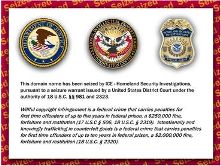 My essay last week for Slate.com (the title I proposed is above, but it must have been too “punny” for the editors) generated a lot of feedback, for which I’m always grateful, even when it’s hostile and ad hominem. Which much of it was.
My essay last week for Slate.com (the title I proposed is above, but it must have been too “punny” for the editors) generated a lot of feedback, for which I’m always grateful, even when it’s hostile and ad hominem. Which much of it was.
The piece argues generally that when it comes to the Internet, a disruptive technology if ever there was one, the best course of action for traditional, terrestrial governments intent on “saving” or otherwise regulating digital life is to try as much as possible to restrain themselves. Or as they say to new interns in the operating room, “Don’t just do something. Stand there.”
This is not an argument in favor of anarchy, or even more generally for social Darwinism. I have something much more practical in mind. Disruptive technologies, by definition, do not operate within the “normal science” of those areas of life they impact. Its problems can’t be solved by reference to existing systems and institutions. In the case of the Internet, that’s pretty much all aspects of life, including regulation.
By design, modern democratic government is deliberative, incremental, and slow to change. That is an appropriate model for regulating traditional areas including property, torts, criminal procedure, civil rights and business law. But when applied to a new ecosystem—to a new frontier, as I suggest in the piece—that model doesn’t work.
Digital life is changing much faster than traditional regulators can hope to keep up with. It isn’t just an interesting business use of information anymore, it’s a social phenomenon, one that has gone far beyond companies finding more effective ways to share data. It’s also, increasingly, a global phenomenon, a poor match for local and even national lawmaking.
Digital life moves at the speed of Moore’s Law, and that is the source of its true regulation. The Internet—acting through its engineers, its users, and its enterprises–governs itself and, while far from perfect, certainly seems to be doing a better job than traditional governments in their traditional venues, let alone online.
The piece gives a short quote from Frederick Jackson Turner, the groundbreaking historian of the American West. The full quote gives additional context to my frontier analogy:
The policy of the United States in dealing with its land is in sharp contrast with the European system of scientific administration. Efforts to make this domain a source of revenue, and to withhold it from emigrants in order that settlement might be compact, were in vain. The jealousy and fears of the East were powerless in the face of the demands of the frontiersman. John Quincy Adams was obliged to confess: “My own system of administration, which was to make the national domain the inexhaustible fund for progressive and unceasing internal improvement, has failed.” The reason is obvious: a system of administration was not what the West demanded: it wanted land.
A few key points from this passage are worth highlighting:
1. Parochialism – Traditional governments attempting to regulate new and disruptive technologies rarely have the best interests of the users in mind. Instead, they try to exploit the new ecosystem, at best, as a stalking horse for regulation they could get away with in traditional contexts but hope to foist off on the more poorly-organized inhabitants of the frontier. At worst, governments captured by the vested interests most threatened by the disruption of the new technology attempt to slow down the pace of change, to preserve the interests of those in the process of being upended.
That’s in part why, despite increasingly desperate efforts by the East to impose its regulatory will on the West, those efforts failed. The East was interested in exploiting western lands for their own benefit, not optimizing the West’s potential to create a new kind of society and economic system. The East was working against the momentum of transformation. It understood little of how frontier life was evolving, and its laws couldn’t keep up with the pace of change even if they were enforceable, which they weren’t. Nor should they have been.
One need only look to one of the first U.S. efforts to regulate the Internet for an example of the first kind of lawmaking. The Communications Decency Act, passed in 1996 and signed by President Clinton, banned classes of content on the Internet that were perfectly legal in the U.S. in any other media. (Similar bans have been enacted, often with more bite or more focused morality, in other counties, including Thailand, Pakistan, China, the E.U., and others.)
That law, and subsequent efforts to impose an antediluvian morality on U.S. Internet users, was summarily tossed out by the U.S. Supreme Court as a facial violation of the First Amendment. Its passage inspired John Perry Barlow to issue his famous “Declaration of the Independence of Cyberspace,” which pointed out correctly that traditional governments have anything but the best interests of this new environment in mind when they put pen to paper.
As an example of regulation to protect vested (and obsoleting) interests, consider the 1998 Digital Millennium Copyright Act, in which content owners unwilling or unable to adapt to the new physics of digital distribution, convinced their lawmakers to impose brutally restrictive new limits on digital technologies. They bought themselves far greater protection from reverse engineering, fair use, and the First Sale doctrine than they had achieved in the real world.
Whether those protections are enforceable, or whether they used the time it bought them to get ready for a more orderly transition to digital life, remain to be seen. But the prospects are predictably poor. Just ask Pope Urban VIII, who banned Galileo’s insistence that the Earth revolved around the Sun. No matter how long Galileo stayed in prison, the orbits didn’t change.
Indeed, it’s hard without doing an exhaustive survey to think of a single piece of traditional law aimed at helping or saving the Internet that wasn’t at best naïve and at worse intentionally harmful–including laws that grant law enforcement more powers online than they have in their native territory. That’s why I’m surprised when some of my fellow frontiersman short-sightedly rush back to Washington at the first sign of trouble with Native populations, or with saloon-keepers, or with the railroads, or with any other participant in the ecosystem who isn’t living up to their standards. They should know that it’s both dangerous, and pointless, to do so.
2. Impotence – In some sense, in other words, it doesn’t matter whether terrestrial governments regulate or not. We have ample evidence – file-sharing, spam, political dissent, porn, gambling–that even those activities that have been banned go on without much regard for the legal consequences. The government of Egypt (and Burma, and Pakistan, and China) can shut down Internet access for a short or for a long period of time. But the disruption in service is a mere blink in the eye in Internet time. Let’s see who wins the stand-off that ensues, and how quickly the Law of Disruption takes hold. Bets gladly accepted here.
As Barlow wrote in his Declaration, “You have no moral right to rule us nor do you possess any methods of enforcement we have true reason to fear.” Put another way, in nearly every conflict between Moore’s Law and traditional law, Moore’s Law wins. Digital life will make its own “social contract” whether traditional governments give it permission to or not.
3. Reverse engineering government – To repeat, the absence or ineffectiveness of traditional regulators in digital life does not translate to anarchy and chaos. There is a social contract to online life, and it will be followed by more organized and organic forms of governance. As I wrote in the piece, “the posse and the hanging tree gave way to local sheriffs and circuit-riding judges.”
That does not mean, however, that over time the old forms of government and regulation will finally win the battle and establish their norms on digital life. Quite the opposite. What has been and will continue to develop are forms of online governance that are suited to the unique environmental properties of digital life.
For now, we can already see that the new institutions will be more democratic–more directly democratic—for better and for worse. (As Madison said, “If every Athenian had been a Solon, every Greek Assembly would still have been a mob.”) Watch how the users of Facebook, Twitter, YouTube, World of Warcraft, iTunes, and Android respond to efforts by the sovereigns of these domains to dictate the terms of the social contract, and you’ll see how the new social contract is being worked out.
There’s more. Turner points out that the organic forms of governance that emerged from the American West didn’t simply create a new form of frontier law. It created American law. Once the global inhabitants of digital life work out their rules and enforcement mechanisms, in other words, they are unlikely to settle for a system any less efficient back on terra firma. Turner writes, “Steadily, the frontier of settlement advanced and carried with it individualism, democracy, and nationalism, and powerfully affected the East and the Old World.”
Who will impose their collective will on whom, and which form of government will become obsolete? Again, anyone care to place a wager?
This is starting to sound like the outline of something much longer. So I’ll stop there.
 For CNET this morning, I offer five crucial corrections to the Protect IP Act, which was passed out of committee in the Senate back in May.
For CNET this morning, I offer five crucial corrections to the Protect IP Act, which was passed out of committee in the Senate back in May.



